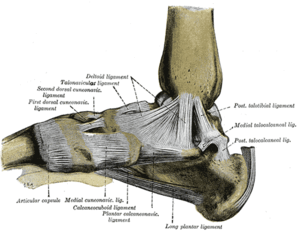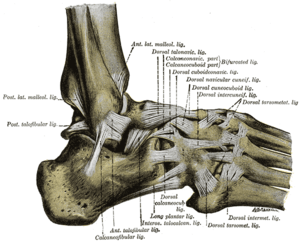Calcaneocuboid joint
The calcaneocuboid joint is the joint between the calcaneus and the cuboid bone.
| Calcanecalcaneocuboidea | |
|---|---|
 Ligaments of the medial aspect of the foot. (Calcaneocuboid labeled at bottom center.) | |
 The ligaments of the foot from the lateral aspect. (Calcaneocuboid labeled at top, third from right.) | |
| Identifiers | |
| TA | A03.6.10.204 |
| FMA | 35207 |
| Anatomical terminology | |
Ligaments
The ligaments connecting the calcaneus with the cuboid are five in number, viz., the articular capsule:
- the dorsal calcaneocuboid ligament,
- part of the bifurcated ligament,
- the long plantar ligament,
- and the plantar calcaneocuboid ligament.
Movements
The calcaneocuboid joint is conventionally described as among the least mobile joints in the human foot. The articular surfaces of the two bones are relatively flat with some irregular undulations, which seem to suggest movement limited to a single rotation and some translation. However, the cuboid rotates as much as 25° about an oblique axis during inversion-eversion in a movement that could be called obvolution-involution. [2]
Notes
This article incorporates text in the public domain from page 354 of the 20th edition of Gray's Anatomy (1918)
- Gray's Anatomy (See infobox).
- Greiner & Ball 2008
gollark: No idea if they released that.
gollark: Go 2 does, I think?
gollark: (although, yes, you can *leak* things, but it's harder to do accidentally)
gollark: The type system forbids using stuff multiple times, so its lifetime can be accurately tracked.
gollark: Linear types!
References
- Greiner, Thomas M; Ball, Kevin A (2008). "The calcaneocuboid joint moves with three degrees of freedom". J Foot Ankle Res. 1 (Suppl 1). doi:10.1186/1757-1146-1-S1-O39. PMC 2562120.CS1 maint: ref=harv (link)
This article is issued from Wikipedia. The text is licensed under Creative Commons - Attribution - Sharealike. Additional terms may apply for the media files.